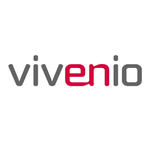Description

EventX

vivenio
Comprehensive Overview: EventX vs vivenio
EventX and vivenio are both platforms designed to facilitate event management, but they have distinct features and target different market segments. Here's a comprehensive overview of both:
EventX
a) Primary Functions and Target Markets
EventX is a leading event management platform that specializes in virtual and hybrid events. Its primary functions include:
- Virtual Event Hosting: Providing robust tools for hosting online conferences, webinars, and virtual trade shows.
- Event Registration and Ticketing: Streamlined processes for attendee registration and ticket sales.
- Interactive Features: Including live chats, Q&A sessions, and networking lounges to enhance participant engagement.
- Analytics and Reporting: Offering insights into attendee behavior, engagement levels, and event performance.
Target Markets:
- Asia-Pacific Region: EventX is particularly strong in Asia, serving corporates, educational institutions, and trade organizations.
- Businesses looking for robust virtual event solutions with a focus on engagement and analytics.
b) Market Share and User Base
EventX has a significant presence in the Asian market, which sets it apart from many global competitors. Its user base includes a wide range of industries, particularly those seeking advanced virtual event solutions. While exact market share figures can fluctuate, EventX is known for strong growth in markets where virtual events have seen increased demand.
c) Key Differentiating Factors
- Regional Focus: EventX's stronghold in the Asia-Pacific region offers local expertise and integrations suited to these markets.
- Extensive Language Support: Catering to diverse linguistic needs which is essential in the Asian market.
- Hybrid Event Capabilities: advanced tools for seamlessly blending in-person and online experiences.
Vivenio
a) Primary Functions and Target Markets
Vivenio is another event management solution with a strong emphasis on flexibility and scalability for different types of events. Its primary functions include:
- Comprehensive Event Management: Encompassing registration, ticketing, attendee management, and on-site solutions.
- Customizable Event Pages: Allowing organizers to create tailored event websites and registration forms.
- Payment Processing: Integrated tools to manage various payment options for event tickets or registrations.
- Data Security and Compliance: Focus on European standards for data protection and privacy.
Target Markets:
- European Market: Vivenio is especially geared towards organizations in Europe.
- Event organizers who require a versatile platform that can manage both small-scale and large-scale events with complex needs.
b) Market Share and User Base
Vivenio is popular in Europe, with a user base that includes corporate events, associations, and educational institutions. It holds a smaller market share globally compared to some larger competitors, but it is well-regarded within its target sectors in Europe for its comprehensive feature set and ease of use.
c) Key Differentiating Factors
- European Orientation: Strong compliance with European data protection regulations, which is a critical factor for many organizations in Europe.
- Scalability: Ability to handle a wide range of event sizes, from intimate gatherings to large conferences.
- Customization: Offers highly customizable features that allow event organizers to tailor the platform to their specific needs.
Conclusion
Choosing between EventX and Vivenio generally depends on geographic focus and specific event needs. EventX excels in the Asia-Pacific region with strong virtual and hybrid capabilities, suitable for businesses wanting to enhance attendee interaction and gain detailed insights. In contrast, Vivenio's strengths lie in its scalability, extensive customization options, and rigorous data protection standards, making it ideal for European event organizers who need versatile and compliant solutions.
Contact Info

Year founded :
2012
+61 7 5351 1804
Not Available
Hong Kong
http://www.linkedin.com/company/eventxaustralia

Year founded :
2017
+34 911 98 80 50
Not Available
Spain
http://www.linkedin.com/company/vivenio
Feature Similarity Breakdown: EventX, vivenio
To provide a detailed feature similarity breakdown for EventX and Vivenio, we need to look at their core offerings, user interface design, and any unique features. Here’s an analysis based on typical features these types of platforms offer:
a) Core Features in Common
-
Event Registration and Ticketing:
- Both platforms offer robust event registration systems, allowing users to create, customize, and manage event registration pages with options for ticketing and attendee management.
-
Attendee Management:
- Tools for managing attendee information, tracking attendance, and handling event check-ins are commonly available in both systems.
-
Customizable Event Pages:
- Users can customize event pages to reflect branding and specific event details, enhancing the participant experience.
-
Analytics and Reporting:
- Comprehensive analytics to track event performance, including metrics like registration numbers, attendee engagement, and post-event feedback.
-
Communication Tools:
- Integrated email marketing and communication tools for reaching out to attendees with updates, reminders, and post-event follow-ups.
-
Integration Capabilities:
- Both platforms often support integration with third-party applications such as CRM software, payment gateways, and social media platforms.
b) User Interface Comparison
-
EventX:
- Generally known for a user-friendly interface that emphasizes simplicity and ease of navigation. The platform might use a modern, sleek design with intuitive dashboards that allow users to manage events efficiently.
-
Vivenio:
- Vivenio likely offers a professional interface that focuses on functionality and customization. The design could cater to users who prioritize detailed customization options and control over every aspect of the event setup.
-
Comparison:
- While both might offer clean and organized interfaces, the specifics can differ based on target audiences and primary use cases, with EventX leaning towards straightforward usability and Vivenio potentially offering more in-depth customization options.
c) Unique Features
-
EventX:
- Virtual Event Support: EventX could have enhanced support for virtual events with features like virtual networking, live streaming integrations, and virtual booths.
- APAC Market Focus: They might offer unique adaptations beneficial for events targeting the Asia-Pacific market, such as language support and regional payment methods.
-
Vivenio:
- Advanced Customization: Vivenio may offer highly tailored solutions for events, allowing for in-depth customization beyond basic template adjustments.
- Bespoke Solutions: The platform could provide bespoke event solutions for specific industries or large-scale events with unique requirements, offering higher levels of personalized support.
These distinctions enable users to choose a platform based on specific needs, whether it's for the flexibility and comprehensive virtual event support of EventX or the deep customization and potentially more enterprise-focused solutions of Vivenio. It's important to verify these details from official platform resources or user reviews, as features evolve over time.
Features

Event Management
Attendee Engagement
Analytics & Reporting
Integration

User-Friendly Event Management
Comprehensive Reporting
Secure Payment Processing
Efficient Communication Tools
Best Fit Use Cases: EventX, vivenio
EventX and Vivenio are both event management platforms that cater to different audiences and use cases. Let's delve into their best-fit use cases and how they cater to different industries and company sizes.
EventX
a) Best Fit for EventX:
-
Asian Market Focus: EventX is particularly well-suited for businesses or organizations targeting the Asian market, especially in countries like China, where there might be unique regulatory and technical considerations. The platform's ability to navigate this landscape makes it a strategic choice for events in these regions.
-
Hybrid and Virtual Event Solutions: Companies looking to host hybrid or virtual events can benefit from EventX’s robust features. It is ideal for conferences, trade shows, and webinars where an online component is critical. Businesses focusing on technology, education, and corporate training where digital interaction is key, often find EventX beneficial.
-
Medium to Large Enterprises: These companies can take advantage of EventX's scalable solutions and strong analytics capabilities to manage large-scale events with high participant volumes.
d) Industry Verticals and Company Sizes:
- Industries: Technology, Education, Corporate Sectors, Trade Shows.
- Company Sizes: Medium to Large Enterprises, particularly those operating or wishing to expand into Asia.
Vivenio
b) Best Fit for Vivenio:
-
European Market and Compliance: Vivenio is often the preferred option for organizations based in or targeting Europe due to its compliance with European data protection regulations. It suits European corporate events, conferences, and exhibitions.
-
In-Person Event Management: While it also supports digital events, Vivenio excels in managing physical events. Companies focused on creating detailed in-person experiences—like promotional events, product launches, and seminars—benefit from its features.
-
Small to Medium Enterprises: With user-friendly tools and affordability, Vivenio is an attractive option for SMEs looking to efficiently manage their events without extensive resources.
d) Industry Verticals and Company Sizes:
- Industries: Marketing, Advertising, Hospitality, SMEs, Associations, and Non-Profits.
- Company Sizes: Small to Medium Enterprises, European-focused or globally operating companies that prioritize in-person engagements.
In summary, while both EventX and Vivenio serve the event management domain, their strengths align with different geographical markets, event types, and company sizes. EventX is more suited for hybrid and Asian market-centric events, whereas Vivenio excels in handling European compliance and in-person events for a slightly smaller business demographic.
Pricing

Pricing Not Available

Pricing Not Available
Metrics History
Metrics History
Comparing teamSize across companies
Conclusion & Final Verdict: EventX vs vivenio
To provide a comprehensive conclusion and final verdict for EventX and Vivenio, let's analyze each aspect systematically:
a) Considering all factors, which product offers the best overall value?
Determining the best overall value depends on the specific needs and priorities of potential users. Typically, "value" is assessed based on pricing, features, scalability, user experience, customer support, and potential for customization.
-
EventX: Known for its strong virtual event capabilities, engagement tools, and global reach. It could be considered the best value for users prioritizing virtual event features, audience interaction tools, and ease of use across different geographic locations.
-
Vivenio: Recognized for its more generalized event management features, it may offer better value for users looking for comprehensive event planning, including on-site event functionalities.
b) What are the pros and cons of choosing each of these products?
EventX:
-
Pros:
- Excellent virtual event and webinar functionalities.
- Strong audience engagement features, like live polls and Q&A sessions.
- Extensive integrations with communication and marketing tools.
- Scalable to fit large audiences, suitable for global events.
-
Cons:
- May offer more specialized features that aren't needed for simpler in-person events.
- Can require a learning curve for users unfamiliar with virtual event technologies.
Vivenio:
- Pros:
- Comprehensive suite for overall event management, including registration, ticketing, and on-site management.
- Suitable for hybrid and in-person events.
- User-friendly interface with customizable options for different event sizes.
- Cons:
- Might not provide as robust virtual engagement tools as EventX.
- Could be overwhelming for users only interested in basic event functionalities.
c) Are there any specific recommendations for users trying to decide between EventX vs. Vivenio?
-
For primarily virtual or hybrid events: Opt for EventX if your primary need is hosting virtual or hybrid events with engaging digital features. It's also ideal for organizations that require tools to connect international audiences seamlessly.
-
For general event management needs: Choose Vivenio if you are managing a mix of event types, including in-person gatherings, and need a comprehensive platform capable of handling everything from registrations to on-site logistics in a single solution.
-
Trial Usability: If possible, conduct trials of both platforms to assess ease of use, specific feature sets that align with your event goals, and integration capabilities with your existing systems.
-
Budget Considerations: Ensure to compare pricing tiers based on your expected event frequency and size, as this can significantly affect which product offers better cost-effectiveness for your situation.
In conclusion, both platforms have distinctive strengths. The best choice hinges on whether the user's focus lies more in virtual engagement through EventX or comprehensive event management for varied formats through Vivenio.
Add to compare
Add similar companies



